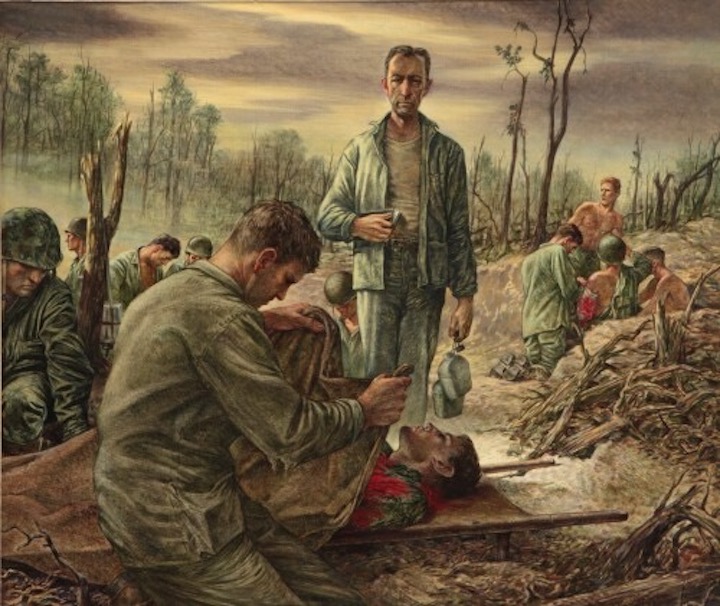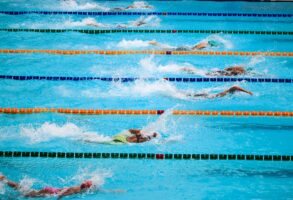
Published February 14, 2022
For many families, the storm clouds currently gathering over Ukraine stir up some poignant memories.
Bill Degnan was born at the end of World War I, the oldest boy in an Irish Catholic family of ten. His dad worked the high beams in New York City construction. The family lived half a notch above poverty. Bill’s youngest brother Winnie died of diphtheria in childhood. But Bill and his other brother Joe made it to adulthood. After Pearl Harbor, they both enlisted. They didn’t hesitate. They were eager to go. It was the right thing to do. Joe served as a Navy radioman on a submarine in the Pacific. Bill joined the army, crewed a tank destroyer, and saw action in Europe. Both survived the war.
They were my uncles. I knew them as a child. They were good men, very Catholic, and I loved them. I grew up in their shadow on a steady 1950s diet of heroic war films made in the wake of V-E and V-J Days. Moral clarity, personal sacrifice, and a sense of national purpose pervaded that generation of combat films. I saw men like Bill and Joe reflected in those movies.
War stories took a darker turn with Korea and Vietnam. In their cynicism, movies became a kind of reverse image of the patriotic melodramas they replaced. It wasn’t until Steven Spielberg’s brilliant Saving Private Ryan (1998), followed by the superb HBO miniseries, Band of Brothers (2001), that film found a way to blend the moral necessity of a just war with its bitter cost in suffering and violence. Patriotism, properly understood, is a virtue. But it can come with a very high, very ugly price tag.
More recently, HBO produced The Pacific (2010), a miniseries that followed Marines who fought in the jungles and across the islands of the Pacific. It’s unforgettable. I’ve seen the Spielberg film and both HBO series several times. The war in Europe was terrible and devastating, but it was waged in the rubble of a shared Western culture. The war in the Pacific had a deeper, purer level of unremitting ferocity, unencumbered by any memory of a commonly held religion or system of ethics, and often made worse by race hatred on both sides. The Geneva Convention and its “rules of war” were widely ignored. As a result, the violence portrayed in The Pacific is both accurate and appalling in its realism.
So where am I going with this?
The Roman poet Horace wrote the famous line Dulce et decorum est pro patria mori in the first century B.C. – the late Roman Republic of intense national pride, ambition, and territorial expansion. Two thousand years later, the same Latin words are carved in stone by another republic – our own – above an entrance to the Memorial Amphitheater at Washington’s Arlington National Cemetery. They translate as “It is sweet and fitting to die for one’s homeland,” or more accurately, “the land of one’s fathers.”
The poet’s words endure over the centuries because, in their melancholic nobility, they’re true. It is a good thing to defend the people we love and the nation we call home. It is a good thing to risk one’s comfort and freedom, and ultimately when needed, one’s life, to protect others and resist evil.
It’s true that patriotism can morph in toxic directions. The nation can become a kind of idol. As Chesterton suggested, “my country right or wrong” makes as much sense as “my mother, drunk or sober.” Our loyalties have moral limits. But human beings are creatures of place and the relationships that take root and bear fruit in it. That “belonging” to something more than ourselves – the place and people that give us life, shape us, and sustain us – is what we mean by home, and why the best ideals of a “homeland” can rightly demand our service.
American Catholics have always understood this. Catholics have typically filled the ranks at the service academies in disproportionate numbers. A similar pattern (as Protestant scholar Stanley Hauerwas once observed) can be traced in the nation’s security and intelligence agencies. Nine chaplains have earned the Medal of Honor in America’s military history. Five were Catholic priests.
Love of country moved Bill and Joe Degnan to enlist. At war’s end, Joe came home from the Pacific, raised a family, and had a good career with General Motors. Bill had a different experience. In close-quarter fighting at the Bulge, his anti-tank vehicle took a direct hit. The fuel and ammunition detonated, incinerating the crew – except for Bill, who was thrown thirty feet by the explosion and severely injured.
Over time, Bill recovered, at least physically. Back home he married a good woman. They had a beautiful daughter, my cousin Mary. Bill was a hard worker, but he had trouble holding a job. He’d do well for a few years, then disappear into Veterans Administration hospitals for shock therapy and counseling. He always returned to his family peaceful and well. That’s how I remember him. But it never lasted. He could never quite forget the explosion, the screams, or the smell. When Mary died in a teen car crash, he was never the same.
Bill Degnan was a good Christian man: a faithful husband, a loving father, and a daily communicant. And then one day he just gave up. He went into his garage, threw a rope over a beam, and hanged himself.
I’ve prayed for Bill nearly every day for more than fifty years. I don’t really worry about his soul. God is too rich in mercy to forget a man broken by suffering he didn’t create or deserve. But I share Bill’s story for a reason. Before we get into a war – any war; even a “good” war – we need to think very hard about its real human cost. And I can’t help but wonder whether Bill fought and suffered for a nation and a people. . .that we no longer are.
Francis X. Maier is a senior fellow in Catholic studies at the Ethics and Public Policy Center and the 2020-22 senior research associate at the Notre Dame Center for Citizenship and Constitutional Government.
Image: Sickbay in a Shellhole by Tom Lea, 1944 [U.S. Army Center of Military History, Fort Belvoir, Virginia]
Francis X. Maier is a Senior Fellow in the Catholic Studies Program at the Ethics and Public Policy Center. Mr. Maier’s work focuses on the intersection of Christian faith, culture, and public life, with special attention to lay formation and action.











